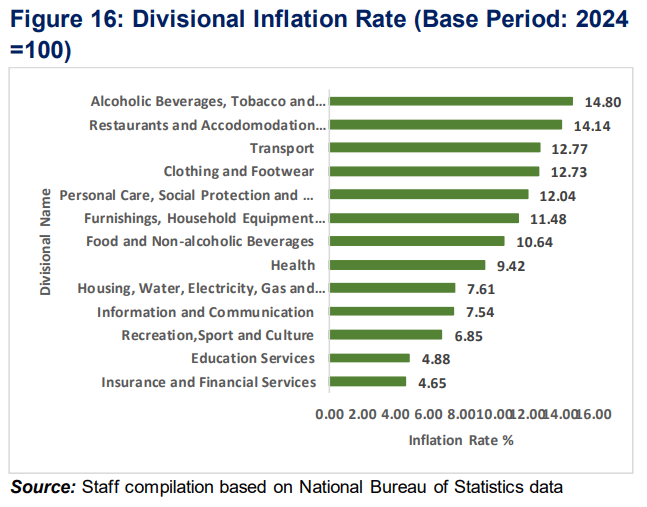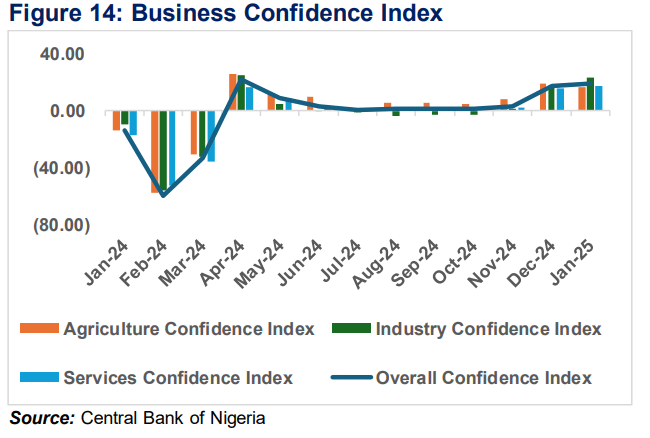- Regal Capital
- Posts
- Economic Insights: Nigeria (01/07/25)
Economic Insights: Nigeria (01/07/25)
Nigeria's economy showed mixed signals in Q1 2025. GDP growth reached 3.40% in 2024, with projections for 2025 at 3.70%. Nigeria’s trade surplus contrasts with South Africa’s Q1 2025 deficit (-$3.1bn), but trails Egypt’s export-led recovery (15% YoY growth). Continent-wide, digitalization and non-oil exports remain critical for resilience against commodity shocks
Macroeconomic Recap (Past Month)
Inflation moderated to 23.71% in April 2025 (down from 24.23% in March), while food inflation eased to 21.26%.

The trade surplus surged 51.07% YoY to ₦5.17tn in Q1 2025, driven by export growth of 7.42%. The naira appreciated marginally by 1.16% in January 2025 to ₦1,535.94/US$, though FX reserves dipped to $38.88bn (covering 8.82 months of imports) . PMI data from the central bank shows recovery across industries, but rising poverty remains a concern amid persistent inflation

Policy & Regulatory Developments
Monetary Policy:
The Central Bank of Nigeria (CBN) held its Monetary Policy Rate (MPR) steady at 27.5% in May 2025, maintaining asymmetric corridors (+500/-100 bps) and liquidity ratios. This reflects cautious optimism amid moderating inflation and FX stability.
Fiscal Policy:
The 2025 budget (₦54.99tn), nearly double 2024’s allocation, prioritizes security and economic stabilization. Key predictions and assumptions include:
Exchange rate appreciation to ₦1,400/US$
Oil production target of 2.06 million bpd
Inflation reduction to 15% (from 34.6%)
Regulatory Shifts:
The Nigeria Visa Policy 2025 (NVP 2025) introduced streamlined e-visas for short-term visits, effective May 2025, to boost business/tourism inflows.
Trade, Currency & Sectoral Flows
Exports hit ₦20.6tn in Q1 2025 (+7.42% YoY), led by crude oil (₦12.96tn, 62.89% of total) and natural gas (₦1.93tn). Non-oil exports surged, particularly to India (₦2.84tn, +76.35% YoY), where non-crude exports (₦1.43tn) surpassed crude. Imports rose moderately, but the trade surplus expansion signals robust external sector health. FX Markets May 2025 saw $5.96bn inflows into the NFEM (+62% MoM), driven by domestic sources and narrowing parallel market gaps
Industrial Insight
ICT growth is projected at 13.18% in 2025, fueled by digital expansion and mobile adoption. Agriculture (22–25% of GDP) and transportation (6.77% growth) are gaining momentum through agro-processing and logistics investments. Satellite and mobile data indicate rising informal trade diversification, particularly in cashew nuts and urea exports to India. However, climate risks and rural insecurity threaten agricultural output, potentially exacerbating food inflation.
Outlook
Nigeria’s GDP is projected to reach 3.6% in Q1 2025 and 4.3% by 2026, driven by non-oil sectors (ICT, agriculture, and manufacturing). Comparatively, this lags behind Kenya’s 5.5% and Egypt’s 4.8% 2025 growth forecasts (IMF), but exceeds South Africa’s 1.8%.
Investment Outlook:
Equities: Overweight ICT and agro-processing sectors, leveraging digitalization tailwinds.
Fixed Income: Expect yield compression if inflation moderates to 15% as budgeted.
FX Strategy: Hedging advised amid projected naira volatility; CBN policies may stabilize rates by Q4 2025.
Risks:
Downside: Oil production shortfalls, security crises, or FX depreciation could stifle growth.
Upside: ICT/export diversification may accelerate if structural reforms deepen.
Disclaimer
This website and all materials contained herein are issued by Regal Capital Botswana (Pty) Ltd ("Regal Capital") for informational purposes only and do not constitute investment advice, a solicitation, or an offer to buy or sell any financial instruments. The content is general in nature and does not consider specific investment objectives, financial situations, or individual needs. While Regal Capital strives for accuracy, no representation or warranty, express or implied, is made regarding the completeness, reliability, or accuracy of the information. Any opinions or estimates reflect the author’s judgment as of the publication date and are subject to change without notice. Regal Capital, its affiliates, directors, employees, agents, or contractors shall not be liable for any direct, indirect, or consequential loss or damage resulting from the use of or reliance on this website. Users should seek independent financial advice before making any investment decisions.
All intellectual property rights in this website are proprietary to Regal Capital or authorized third-party sources. No content may be reproduced, distributed, or transmitted without prior written permission. Investing involves risks, including potential capital loss. Past performance is not indicative of future results, and investments in foreign currencies are subject to exchange rate fluctuations. The strategies or instruments mentioned may not be suitable for all investors.
By accessing research materials, users acknowledge that Regal Capital and its affiliates may hold positions in securities discussed. Research is provided “as is” without warranties of accuracy or completeness and should not be considered a recommendation or solicitation. Users are encouraged to conduct their own due diligence and consult financial, legal, or tax advisors. Regal Capital is not liable for any trading losses, lost profits, or other damages resulting from reliance on its research. Use of this website is governed by the laws of Botswana, and users agree to the jurisdiction of its courts for any disputes
Reply